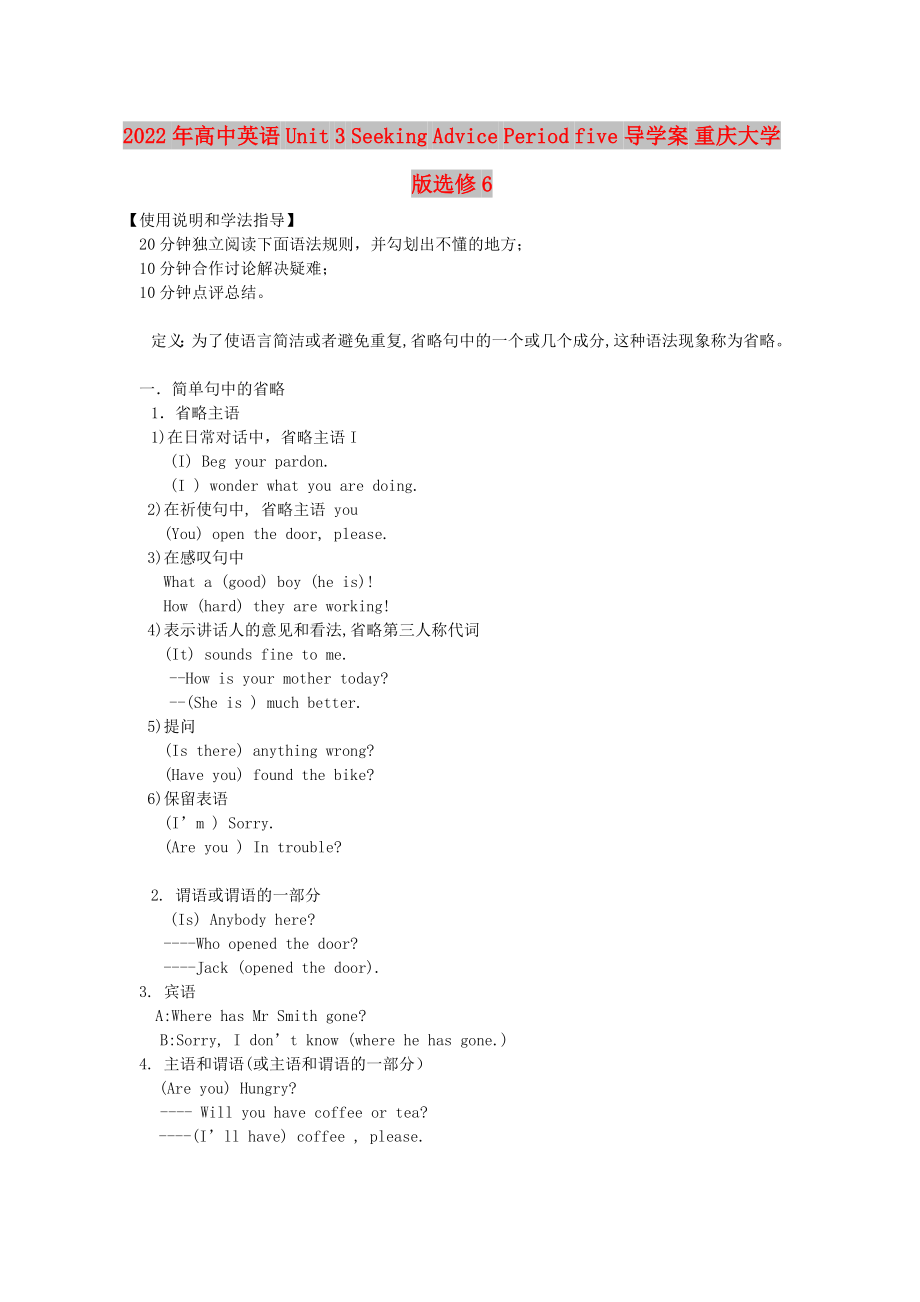《2022年高中英語(yǔ) Unit 3 Seeking Advice Period five導(dǎo)學(xué)案 重慶大學(xué)版選修6》由會(huì)員分享��,可在線閱讀,更多相關(guān)《2022年高中英語(yǔ) Unit 3 Seeking Advice Period five導(dǎo)學(xué)案 重慶大學(xué)版選修6(2頁(yè)珍藏版)》請(qǐng)?jiān)谘b配圖網(wǎng)上搜索���。
1���、2022年高中英語(yǔ) Unit 3 Seeking Advice Period five導(dǎo)學(xué)案 重慶大學(xué)版選修6
【使用說明和學(xué)法指導(dǎo)】
20分鐘獨(dú)立閱讀下面語(yǔ)法規(guī)則,并勾劃出不懂的地方��;
10分鐘合作討論解決疑難��;
10分鐘點(diǎn)評(píng)總結(jié)��。
定義:為了使語(yǔ)言簡(jiǎn)潔或者避免重復(fù),省略句中的一個(gè)或幾個(gè)成分,這種語(yǔ)法現(xiàn)象稱為省略�。
一.簡(jiǎn)單句中的省略
1.省略主語(yǔ)
1)在日常對(duì)話中,省略主語(yǔ)I
(I) Beg your pardon.
(I ) wonder what you are doing.
2)在祈使句中, 省略主
2���、語(yǔ) you
(You) open the door, please.
3)在感嘆句中
What a (good) boy (he is)!
How (hard) they are working!
4)表示講話人的意見和看法,省略第三人稱代詞
(It) sounds fine to me.
--How is your mother today?
--(She is ) much better.
5)提問
(Is there) anything wrong?
(Have you) found the bike?
6)保留表語(yǔ)
(I’m ) Sorry.
(Are yo
3�、u ) In trouble?
2. 謂語(yǔ)或謂語(yǔ)的一部分
(Is) Anybody here?
----Who opened the door?
----Jack (opened the door).
3. 賓語(yǔ)
A:Where has Mr Smith gone?
B:Sorry, I don’t know (where he has gone.)
4. 主語(yǔ)和謂語(yǔ)(或主語(yǔ)和謂語(yǔ)的一部分)
(Are you) Hungry?
---- Will you have coffee or tea?
----(I’ll have) coffee , please.
4��、
5. 其他常見的省略現(xiàn)象
1) 名詞所有格修飾的名詞若表示店鋪,住宅,教堂或上下文已暗示或明確指出過的事物���。
At her mother’s (house) she passed many happy days.
I met him at the doctor’s (office).
2)不定式后省略動(dòng)詞, 如果不定式表示的內(nèi)容在前面出現(xiàn)過���,在下文再次出現(xiàn)時(shí)可以單純使用不定式符號(hào)to
A: Would you like to e to the party?
B: I’d love to (e the party.)
–Have you ever been t
5����、o the seaside?
–-No, we can’t afford to (go to the seaside).
【聯(lián)想】不定式省略情況如下:
① 在形容詞afraid, glad, pleased, eager, willing等后面��。
------ Will you join us in the game?
------ I ‘ll be glad to (join you in the game).
② 在某些動(dòng)詞后面���,如afford, expect, intend, forget, refuse, want, wish等。
I asked him to s
6�、ee the film, but he didn’t want to (see the film).
He didn’t e, though we had invited him to (e).
③ 在be going to, be able to, have to, ought to, used to 后面
I didn’t want to wait for her, but I had to (wait for her).
They don’t visit their parents as much as they ought to (visit their parents)
7、.
【注意】如果省略的不定式內(nèi)容是be或助動(dòng)詞have, to后要保留be或have.
---- Are you a teacher? ---- No, but I used to be.
----He hasn’t finished yet. ----Well, he ought to have.
二.并列句中的省略
1.后面分句中與前面相同的常被省略
She was poor but (she was) honest.
2.有時(shí)并列句中的省略部分出現(xiàn)在前面的分句中�,看完最后一個(gè)分句才能掌握全句的完整意義。
Mary can (speak English) and (Mary) ought to speak English.
三.慣用的省略結(jié)構(gòu)
1.固定句型 How/What about …
What about some more milk?
2.Why not +省去to的動(dòng)詞不定式
Why not go at once?
 2022年高中英語(yǔ) Unit 3 Seeking Advice Period five導(dǎo)學(xué)案 重慶大學(xué)版選修6
2022年高中英語(yǔ) Unit 3 Seeking Advice Period five導(dǎo)學(xué)案 重慶大學(xué)版選修6

